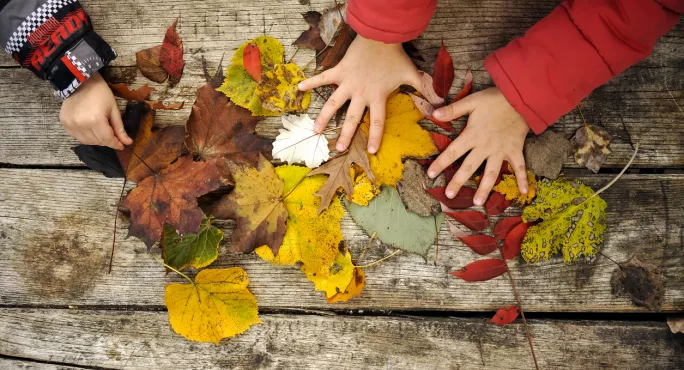- Home
- Why November should be every teacher’s favourite month
Why November should be every teacher’s favourite month

As the clocks go back and the nights draw in, it is easy to think of November as a dreary month in primary schools.
Commutes to and from work are a blur of headlights, windscreen wipers and curses over forgotten brollies and sudden gusts, which whip paper out of curver boxes to flap in puddles as we haul our books, thermal mugs and bags for life across windswept car parks.
No one in education longs for November. No one cites it as their favourite month or their longed-for term. No one cannot wait for November to arrive or misses it when it has passed.
But November is, in fact, the seed of the academic year. It is the month of quiet magic and unseen miracles.
November: the building block of the school year
Not for November is the shiny-shoed fanfare of back-to-school September or the glorious harvest of mellow October. November is hunkered down in classrooms. Bonds forged, relationships stable, teams built, routines established. November is punctuated only by the brief rest of half-term, before it’s back to the building block of the school year.
November is the month of educational germination. The seeds which were planted during those early weeks are beginning to awaken. The assembly rows of children are now less wonky; the books are given out correctly first time. The small details of layout and listening and lining up all require fewer reminders, and the children’s work now elicits sparks of joy and pride, instead of a niggling worry that the standard won’t quite be up to scratch by the end of year.
Reminders seem to be heeded and needed less now, and a quick flick through books show just how far many have come already. The classes now feel truly more like “ours”. Our minds are now not so preoccupied with former classes, and the slightly unnerving newness of it all is being replaced with a mutual understanding and feeling of teamwork.
November brings with it, too, a triangulation of understanding. Parents’ evening has passed in a blur of snatched snacks, nervous exchanges and often much-shared laughter and pride, and now we can often feel so much more connected to our pupils.
The season of wet playtimes
In class, we are beginning to revisit much of those first few weeks of teaching, and it is a month where we can refine and hone and reflect on our impact and practice so far. Just as our children’s November seeds are gradually sending out roots and shoots, so, too, is our practice evolving, as we move through this season of wet playtimes, steaming coats on radiators and cancelled outdoor PE owing to waterlogged pitches.
November sees the trophies of cross-country events being shared in assemblies - hardy souls on the staff and pupil teams who brave ankle-deep mud and sideways rain to represent the school and its communities.
It’s also the season in which the stock cupboard begins to be everyone’s favourite port. Gluestick pirates and craft magpies raid its contents to secure the glitter, coloured cards and anything shiny, to mark the celebrations of a multitude of festivals of light that punctuate the autumn-term calendar.
There is also the whispered undercurrent of the end-of-term production on the horizon. Hushed conversations swing between exclamations of shock that rehearsals haven’t yet begun and cries of “But it’s far too early!”
Quiet reflection
These sit alongside the reverence and quiet of Remembrance: the assemblies and selling of poppies across the school and the silent minute of the school day, where for once the blur of noise, energy and movement of hundreds of children is a tableau of muted, hushed respect.
It’s a quiet and reflective month, which sits contemplatively and unassumingly on the calendar. There is often not a lot to see in November. The school newsletters appear to have an information hiatus after the franticness of September and the forthcoming frenzy of December. Notices are scarce, and yet November is the backbone of the year.
As we teach every lesson and plan every experience, as the days pass in their regular rhythm of assemblies, lessons, playtimes and home times, those seeds we plant are gradually unfurling roots and shoots. Beneath the surface, miracles of learning are occurring. Links are being made, memories set down, pennies dropping and light bulbs going on.
So much of what we are doing lies unseen and seemingly dormant. But, under the surface, magic is occurring. From November’s roots will grow December’s confidence, January’s resilience and resolutions, February’s love of learning, March’s leaps and bounds in understanding, leading to the blooming and celebration of a year well-spent, come the summer term.
And so it is, in the windy, wet and dark month of November, that we should remember to praise the quiet unseen germination of the seeds we have planted, and hold fast to the knowledge that there will be much magic growing from them, as we move through the calendar.
Yes, November may be the month of dark nights and rainstorms. But it is also when we can ensure there is a dazzling display of learning lighting up the unseen worlds inside our pupils’ minds.
Emma Turner is the research and CPD lead for Discovery Schools Academy Trust in Leicestershire. She tweets @Emma_Turner75
Keep reading for just £1 per month
You've reached your limit of free articles this month. Subscribe for £1 per month for three months and get:
- Unlimited access to all Tes magazine content
- Exclusive subscriber-only stories
- Award-winning email newsletters



